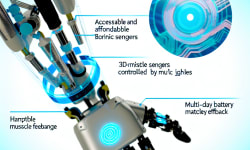
Revolutionary 3D-Printed Bionic Arm Responds to Muscle Signals at an Affordable Price
Date: Aug 11, 2025
Category: Health & Technology
Share on:
You may also like these similar articles

Unraveling the Enigma of Itch: Bacteria's Role Revealed
Researchers have made a groundbreaking discovery, demonstrating how bacteria can trigger itch by stimulating nerve cells in the skin. This revelation holds potential for the development of innovative...

Jasmine Khorsandi and SonoBreasts Revolutionize Breast Health Accessibility Through Innovative Technology
SonoBreasts, the sole clinic in Los Angeles with a SonoCine Automated Whole Breast Ultrasound, is dedicated to making breast health more accessible. Jasmine Khorsandi and SonoBreasts are leveraging...

The Impact of AI on Healthcare: Consumer Surveys Reveal Optimism
Recent surveys indicate that consumers are optimistic about AI's potential to revolutionize healthcare, despite some reservations. As AI continues to make headlines, its role in transforming...

Groundbreaking AI Predicts Individuals' Lifespan
A groundbreaking AI model, trained on the life data of over a million individuals, has demonstrated the ability to predict an individual's lifespan with remarkable accuracy. This innovative...

Breakthrough: World's First Partial Heart Transplant Successfully Grows Valves and Arteries
A groundbreaking achievement in medical science, the world's first partial heart transplant has successfully grown valves and arteries after over a year of research. Duke Health's pioneering...

Embracing Personalized Health Care for Better Outcomes
As the one-size-fits-all approach to healthcare evolves, the focus shifts to personalized medicine. This shift promises safer and more effective treatments tailored to individual needs, ultimately...